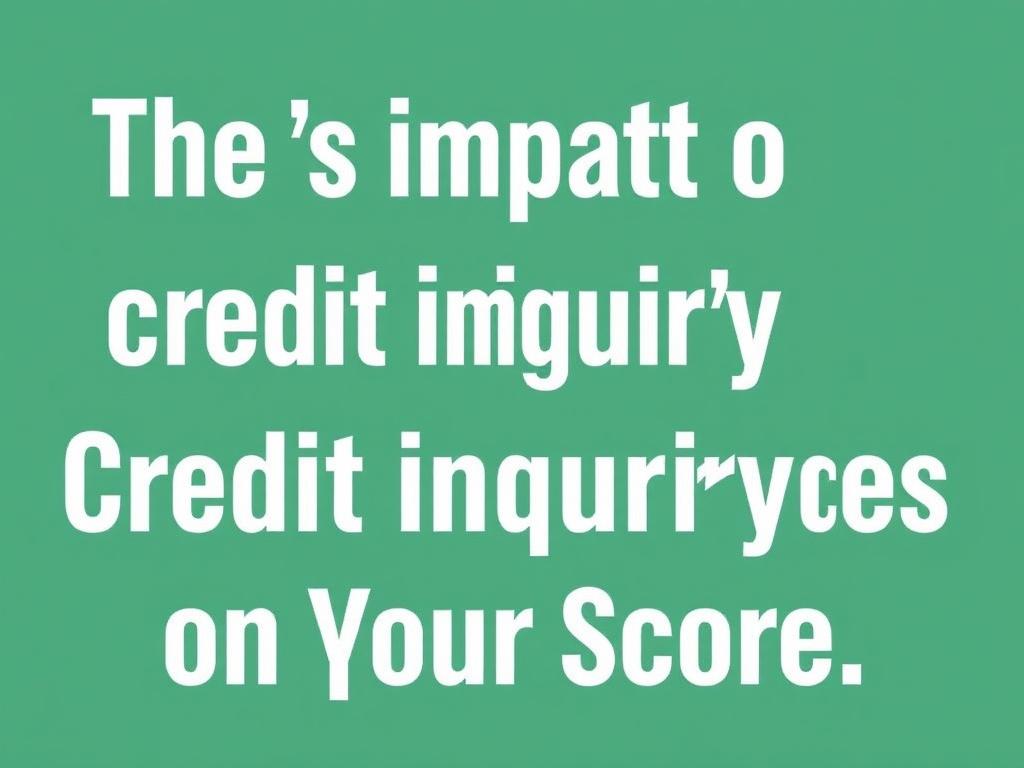SQLITE NOT INSTALLED
When it comes to managing your credit, understanding every factor that affects your credit score is crucial. One element that often causes confusion is credit inquiries. You might have heard that every time you apply for a loan or a credit card, your credit score takes a hit. But is that really the case? How much do credit inquiries affect your credit score, and can they cause long-term damage? In this article, we’ll explore everything you need to know about credit inquiries and their impact on your credit score, shedding light on when they matter and when they don’t.
Содержание
What Are Credit Inquiries?
Credit inquiries occur whenever a lender, creditor, or other authorized party checks your credit report to assess your creditworthiness. There are two main types of credit inquiries: hard inquiries and soft inquiries.
A **hard inquiry** happens when you apply for new credit, such as a mortgage, car loan, credit card, or sometimes even a rental application. This type of inquiry is recorded on your credit report and can influence your credit score.
In contrast, a **soft inquiry** does not affect your credit score. These occur when you check your own credit, a lender pre-approves you for an offer without you applying, or a current lender reviews your account.
Understanding the difference between these two types of inquiries is key to knowing how they impact your credit score.
How Do Hard Inquiries Affect Your Credit Score?

When you apply for new credit, lenders need to assess how risky lending to you could be, and that means pulling your credit report. This results in a hard inquiry. But many people wonder: does this mean a permanent drop in your score?
The truth is that **hard inquiries can lower your credit score, but usually only by a few points**—generally around 5 points or less. The impact is often small, especially if you have a strong credit history. However, if you already have a lot of hard inquiries in a short period, lenders might see that as a sign of risk, and that’s when your score could drop more noticeably.
How Long Do Hard Inquiries Stay on Your Credit Report?
One important detail is the lifespan of a hard inquiry. They **typically stay on your credit report for about two years**. But don’t panic—after about one year, their impact on your credit score diminishes significantly. After that point, credit scoring models often stop factoring them into your score calculations.
Hard Inquiries vs. Applying for Multiple Loans
If you’re shopping for a car loan or a mortgage, you might worry that each lender’s hard inquiry will tank your score. Thankfully, most credit scoring models recognize that rate-shopping is a normal part of borrowing. As a result, multiple hard inquiries for the same type of loan within a short window—usually 14 to 45 days—are typically counted as a single inquiry. This means you can shop around without damaging your credit as long as you do it within the designated time frame.
What About Soft Inquiries?
Soft inquiries have no impact on your credit score whatsoever. You can check your own credit report as often as you like without any penalty. Similarly, when companies do soft checks for pre-approval or background purposes, they aren’t lowering your score.
Examples of Soft Inquiries Include:
- Checking your own credit score or report
- Pre-approved credit card offers
- Background checks for employment
- Existing creditors reviewing your account
Understanding this helps you stay in control of your credit management without worrying about unnecessary drops in your score.
Why Do Credit Inquiries Matter to Lenders?
Lenders use credit inquiries as a signal of how actively you’ve been seeking credit. Many inquiries in a short period may indicate financial distress or risky behavior. For example, if someone applies for multiple credit cards or loans within weeks, lenders may worry about the applicant’s ability to repay.
To give you a clearer picture, here’s a simple table outlining how lenders might interpret inquiries:
| Number of Hard Inquiries | Interpretation by Lenders | Possible Impact on Your Credit Score |
|---|---|---|
| 0 – 1 inquiries in 6 months | Normal activity | Minimal or no impact |
| 2 – 3 inquiries in 6 months | Moderate credit seeking behavior | Small decrease (5-10 points) |
| 4+ inquiries in 6 months | Potential signs of financial stress | Noticeable drop (10+ points) |
This table underscores the importance of spacing out credit applications rather than making many in a short time frame.
Does Checking Your Own Credit Hurt Your Score?

Many people avoid checking their credit because they fear hurting their credit score—that’s a myth! When you pull your own credit report or check your credit score, it’s classified as a soft inquiry, meaning it **does not lower your credit score** at all. In fact, regularly reviewing your credit report is a smart way to catch errors or signs of identity theft early.
How Do Credit Inquiries Compare to Other Factors Affecting Your Credit Score?
While credit inquiries do impact your credit score, they are just one piece of a much larger puzzle. Factors like payment history, credit utilization, length of credit history, types of credit, and recent credit activity generally hold more weight in your credit score calculation.
Here’s a breakdown of typical credit score components and their approximate influence:
| Credit Score Factor | Percentage of Total Score |
|---|---|
| Payment History | 35% |
| Credit Utilization | 30% |
| Length of Credit History | 15% |
| New Credit (Inquiries) | 10% |
| Types of Credit Used | 10% |
As you can see, while new credit inquiries do factor into your score, their influence is less significant than things like your payment history or how much credit you’re using.
Tips to Manage Credit Inquiries Wisely
To make the most of your credit and minimize any negative impact from inquiries, here are some practical tips:
- Limit Credit Applications: Apply for new credit only when necessary.
- Shop Smart: When rate shopping for loans like mortgages or auto loans, keep all applications within a 14-45 day window.
- Monitor Your Credit: Regularly check your credit report through soft inquiries to catch errors early.
- Space Out Applications: Avoid applying for too many types of credit in a short time.
Myths and Misconceptions About Credit Inquiries
There are a lot of misconceptions floating around about credit inquiries. Here are a few common myths debunked:
- Myth: Checking your own credit lowers your score.
Fact: It does not; it’s a soft inquiry. - Myth: All inquiries stay on your credit report forever.
Fact: Hard inquiries remain visible for 2 years but only affect your score for about 1 year. - Myth: Each hard inquiry takes a huge chunk off your score.
Fact: Usually, each hard inquiry lowers your score by only a few points. - Myth: Multiple inquiries for the same type of loan always hurt your score.
Fact: Credit scores treat them as one inquiry if done in a short shopping window.
Understanding the facts will help you navigate your credit with more confidence.
How to Check if You Have Hard Inquiries on Your Credit Report

If you want to know whether hard inquiries are affecting your credit score, the best way is to check your credit report from one of the major credit bureaus: Equifax, Experian, or TransUnion. These reports will list all credit inquiries, along with the date and the company that made the inquiry.
Keep an eye out for any unauthorized or unknown inquiries, which could be a sign of identity theft or fraud. Dispute any inaccuracies with the credit bureau right away.
If you notice hard inquiries that you didn’t authorize, here’s what you should do:
- Contact the creditor that made the inquiry to ask why it was made.
- File a dispute with the credit bureau listing the inquiry.
- Provide any supporting documentation that shows the inquiry was unauthorized.
- Monitor your report for resolution and further suspicious activity.
Being proactive about this helps protect your credit and prevent damage.
Final Thoughts on Credit Inquiries and Your Credit Score
Credit inquiries, both hard and soft, play an important role in your credit profile. While many people worry about inquiries lowering their credit score, understanding how they work can ease those fears. Hard inquiries can impact your score, but the effect is usually small and temporary. Soft inquiries pose no risk at all and are essential for your credit management. The key takeaway is to be thoughtful about when and how often you apply for new credit, monitor your credit reports regularly, and don’t shy away from checking your own credit scores and reports. With this knowledge, you can make informed decisions and maintain a strong credit profile that supports your financial goals.
Conclusion
In summary, credit inquiries are a natural part of your financial life, especially when you seek credit to achieve goals like buying a home or starting a business. Understanding the difference between hard and soft inquiries and their effects on your credit score empowers you to manage your credit wisely. While hard inquiries can cause a small dip, their impact is usually short-lived, and multiple inquiries for the same loan type within a short timeframe are treated kindly by scoring models. Soft inquiries aren’t counted against you at all, so regularly checking your credit is not only safe but recommended. By staying informed and managing inquiries smartly, you can keep your credit score healthy and open doors to better financial opportunities.
Опубликовано: 23 July 2025 Кредитрон – блог о кредитах, финансах и прочих реверансах
Кредитрон – блог о кредитах, финансах и прочих реверансах

